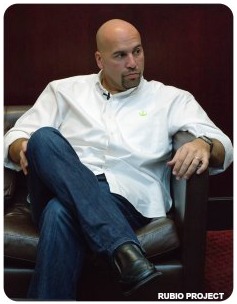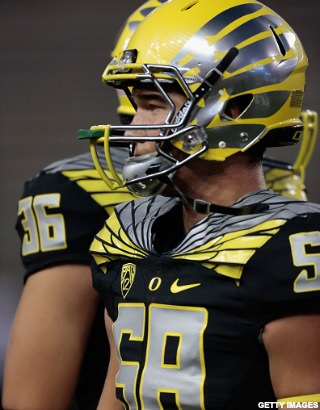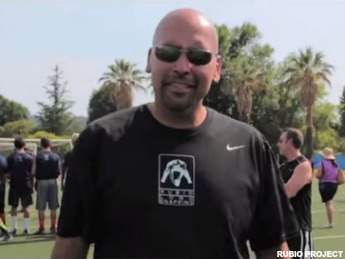For three full seasons, Chris Rubio was the long-snapper for UCLA. During that span, he never botched a single snap.
People didn't treat him like a hero or anything -- long-snappers aren't exactly quarterbacks.
But that's where Rubio would disagree completely. On fourth downs, they more or less are the quarterback.
"When they come in, they have to snap that ball perfectly," Rubio says. "If you could recruit a third-down quarterback to just convert third-downs, and they could do that every single time, wouldn't you do it?"A good long-snapper may not be converting first downs, but in Rubio's estimation he's doing something much more important: Preventing back-breaking errors. One errant snap can cause a punt to get blocked, or it could sail over the punter's head and into a free-for-all down the field.
Rubio understood the need for specialization at the long-snapper position, and he saw an opportunity to kickstart a revolution within football. Instead of leaving the task of long-snapping to a tight end or lineman who took on the duty as a side job, he founded Rubio Long Snapping, a camp designed to teach long-snapping to developing football players who wanted to learn the trade.
It might seem like an unlikely passion, especially within the realm of football, where so many kids want to be glory-getting quarterbacks and hard-hitting linebackers. But Rubio said kids were quick to recognize how much they could gain by specializing in a rare niche.
"I haven’t had to sell [long-snapping] in a long time," Rubio said. "I think the more articles that come out, the more people read about kids getting scholarships, people are saying, 'If there’s a scholarship available for snapping a ball, let’s do it.'"One of the first students I had, he did it just to get a spot on the varsity squad. Now he plays for the Cleveland Browns as a long-snapper."

That Browns long-snapper is Christian Yount, and he went to UCLA just like Rubio. Another of Rubio's former students is Tanner Gibas. Gibas was a tight end without much of a shot at extending his football career beyond high school. But he had watched his older brother study under Rubio and earn a long-snapping scholarship, making him the first in his family to attend college. Gibas followed the same path, and he made it to the University of Kansas as a scholarship long-snapper.
Gibas is still a student there, and he's no longer a long-snapper. Instead, he's turned his attention toward documentary work. This winter, he released a full-length feature he directed that tells the story of Rubio and his highly effective -- and family-oriented -- training program.
When Gibas first approached his former coach about making a documentary, Rubio laughed. Then he figured why not: he was expecting a three or four minute YouTube video. When Gibas explained that no, he'd like to make something longer, he was shocked.
I was pretty surprised," Rubio said, "But I thought, 'OK, man, let’s see how this goes."
Gibas raised money, put together a small crew, and started work on the project. His focus wasn't just on the unprecedented success of Rubio's approach: he wanted to publicize Rubio's personality, his affect on his students, and the unique family atmosphere that has been fostered throughout the long-snapping community."I think [the program's success] has to do with the fact that it’s me and only me that does it," Rubio explained. "I run the entire camp. I run the social media, I do the blog. If you email, I’m the one that answers. If you call, I’m the one that answers."
Rubio is an extremely outgoing and charismatic individual, but a large part of his appeal has to do with his focus on creating opportunities for his students. He isn't just teaching a skill for the sake of teaching it -- he's trying to show his students that they can create incredible opportunities.
In 2014 alone, Rubio said he sent 100 of his long-snapping students to college, with even the most venerated programs offering scholarships to lock down his top-flight recruits. For the 2015 recruiting class -- a group that could continue growing up until the season starts in August -- he already has 85 who have committed to a school.

Within some programs, his recruits are seen as can't-miss investments. A Rubio student has been the long-snapper at Oregon for each of the past 12 seasons. The team's current long-snapper, Tanner Carew, was Rubio's top student in his class.
A handful of students from Rubio's camps have even gone on to the NFL, drawing huge paychecks just for snapping a football.
"College coaches have started to figure it out," Rubio said. "Coaches started jumping on board.
"I was speaking recently to a very, very, very prominent college football coach, and he said he wanted our best long-snapper. I said, 'You'll have to offer a scholarship,' and he said, 'Are you serious?' I told him, 'You don't have to offer him, but he's already got three scholarships waiting for him.
It might have one been seen as foolish to burn a scholarship on a football player whose only skill is snapping the football. But Rubio says that once coaches have been burned by bungled snaps enough times, they change their tune. And Rubio's students come in polished and game-ready.
"They want the best, and they know that I train the best," he said.
When Gibas decided to go ahead with a documentary, he enlisted a friend from high school, Adam Gatdula, to be his assistant director. Together, the two of them planned out their shooting schedule and their vision for the documentary. The process for making the film took a year-and-a-half.
"We all filmed at the camps, -- Rubio gave us the go-ahead to see what we could get creatively," Gatdula said. "He gave us full play to [do what we thought was best]."
Gatdula and Gibas, who are both originally from Covina, California, also set up a Kickstarter fund to raise $20,000 for the movie's production.
With the documentary complete, the young filmmakers have had three showings: in Lawrence, Kansas, where Gibas goes to school, in the Los Angeles area, and in Lewiston, Idaho, Rubio's hometown.
The documentary is also available in its entirely online through Vimeo, and the duo plans on submitting the film to festivals and continuing to share Rubio's story. Although the completed project is a nice feather in each of their caps, they are passionate about spreading the word for what Rubio has done for his students.
"To see him changing boys’ lives from all across the country," Gatdula says, "it's inspiring."
"I don’t want to say [the movie] is finished. People need to hear his story."





